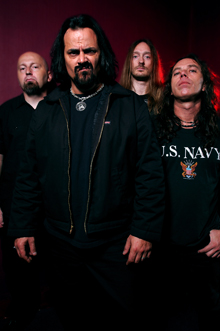Compare & Contrast: The Carter Family vs. Deicide
By wavelength ~ Posted Tuesday, January 30th 2007
By Smokey Campbell
Background: The Carter Family were formed in Maces Springs, Virginia in 1926 and along with Jimmie Rodgers were the seminal country music artists of the 20th century. The Carters wrote or popularized literally hundreds of songs from various folk music traditions of the Appalachians. The clarity, universality, quiet radiance and sheer innovation of their approach results in music that has dated little. Their sound consisted of two female voices, one male voice, autoharp and guitar melodies picked out on the lower strings (in a style known to this day as “Carter” picking). Deicide hailed from Florida in 1987 and quickly established themselves as death metal’s most notorious and (it could be said) religiously devoted practitioners, drawing on their immediate musical environment for inspiration They briefly scared the living shit out of Middle America until gangster rap took over that societal function. Characterized by intense speed, blurry de-tuned guitar riffs and a lot of grunting, Deicide stir up the evil spirits to this day.
Family Act: Alvin P. Carter was married to Sara Carter (née Dougherty). Maybelle Carter (married to A.P’s brother) was Sara’s cousin. After the dissolution of the original Carter Family in 1941, the Carter family children carried on. Until recently, Deicide boasted the most stable line-up in death metal, with brothers Eric and Brian Hoffman shredding their way through the din and cutting some of the most transcendently inapposite guitar solos ever.
Religion: A.P. Carter is referred to as a dour, proper and extremely religious man, and Sara and Maybelle were from most accounts reserved and religiously devoted. Carter Family shows were promoted as decent, morally upright Christian entertainment. Deicide singer/bassist/songwriter/leader Glen Benton repeatedly branded an upside-down cross onto his head, gave his band a name that means the death of God/holiness and (more specifically) is also the name of the charge levied against the killers of Christ, and still refers to himself as a Satanist.
Unreligion: Much of the Carter Family’s potential audience may have seen the spectacle of women being the instrumentalists of a gospel group to be unladylike. Despite biblical pronouncements against divorce, A.P. and Sara went their separate ways in 1939. During the Hoffman brothers’ acrimonious split from Deicide, they levelled the charge that Benton was married in a Christian church — and that he couldn’t play bass.
Fear Factor: The emotional intensity and recording style of nearly all the Carter Family’s work lends to it an austere and spooky quality that colours their music. This applied to their most optimistically joyous gospel numbers, as well as the heartbreaking love songs that were also their stock in trade. A comparison can even be made to the country blues of the same period. The Carter Family’s blues numbers were deft and believable in a way that few other country and western artists were capable. Deicide’s physical intensity, recording style, constant focus on Satan and the dark side of human nature (especially as they pertain to homicidal fantasies regarding Christians and Christ) can be pretty unnerving to even non-Christians, to the extent that even the suggestion that it is being done mostly for shock value does not bring much comfort.
Corn Factor: On first listen, the vocals of both artists are the most prominent and distinctive aspect of their recorded work. They also tend to be the corniest and most amusing aspect. The Carters possessed characteristically unyielding Virginia accents and A.P. Carter’s bass parts have no parallel before or since. Deicide’s vocals are excessively overdubbed (at times containing intentional backwards messages) and over-effected to the point of distraction, rendering them occasionally humourous as opposed to frightening.
Smokey Highly Recommends: Artistic progression is not a hallmark of either artist. However all Carter Family recordings dated 1927-1935 and Deicide’s Deicide (1990), Legion (1992) and The Stench of Redemption (2006) are classics of their kind. A YouTube search will yield archival footage aplenty of the Carter Family including clips from Johnny Cash TV specials from the 1960s where Maybelle Carter can’t play a lick without the crowd bursting into thunderous applause. I felt a tinge of nostalgia while viewing a hilarious clip from a Florida public access show of Deicide (then known as Amon) playing live, circa 1988. Note the costumes, and dreadful bass playing.
